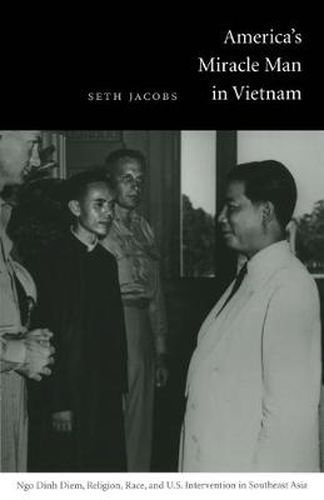Readings Newsletter
Become a Readings Member to make your shopping experience even easier.
Sign in or sign up for free!
You’re not far away from qualifying for FREE standard shipping within Australia
You’ve qualified for FREE standard shipping within Australia
The cart is loading…






As a crucial prerequisite to the incremental steps that led to the devastation and defeat of the Vietnam War, America’s support for Ngo Dinh Diem as the head of South Vietnam from the mid-1950s into the early 1960s proved to be catastrophic. Exploring the rationale for this extraordinarily consequential Cold War policy, Seth Jacobs adds a new layer of complexity to histories attributing the commitment to Diem to anticommunism and a lack of other viable candidates. Jacobs argues that senior U.S. policymakers’ support for Diem grew out of the unprecedented religious revival of the 1950s and the almost complete lack of detailed knowledge about the Far East. He contends that only by taking American religious fervour into account can historians explain why the Eisenhower administration allied with Diem, a devout Catholic, in a nation almost ninety percent Buddhist. A diplomatic and cultural history, America’s Miracle Man in Vietnam draws on government archives, presidential libraries, private papers, movies, and television and radio broadcasts. Jacobs shows in detail how, in the 1950s, U.S. policymakers conceived of the Cold War as a crusade in which Americans needed to combine with fellow Judeo-Christians against an adversary dangerous as much for its atheism as for its military might. He describes how racist assumptions that Asians were culturally unready for democratic self-government predisposed Americans to excuse Diem’s dictatorship as necessary in the Orient. By focusing attention on the role of American religious and racial discourses, America’s Miracle Man in Vietnam provides a necessary corrective to understandings of America’s disastrous commitment to sink or swim with Ngo Dinh Diem.
$9.00 standard shipping within Australia
FREE standard shipping within Australia for orders over $100.00
Express & International shipping calculated at checkout
As a crucial prerequisite to the incremental steps that led to the devastation and defeat of the Vietnam War, America’s support for Ngo Dinh Diem as the head of South Vietnam from the mid-1950s into the early 1960s proved to be catastrophic. Exploring the rationale for this extraordinarily consequential Cold War policy, Seth Jacobs adds a new layer of complexity to histories attributing the commitment to Diem to anticommunism and a lack of other viable candidates. Jacobs argues that senior U.S. policymakers’ support for Diem grew out of the unprecedented religious revival of the 1950s and the almost complete lack of detailed knowledge about the Far East. He contends that only by taking American religious fervour into account can historians explain why the Eisenhower administration allied with Diem, a devout Catholic, in a nation almost ninety percent Buddhist. A diplomatic and cultural history, America’s Miracle Man in Vietnam draws on government archives, presidential libraries, private papers, movies, and television and radio broadcasts. Jacobs shows in detail how, in the 1950s, U.S. policymakers conceived of the Cold War as a crusade in which Americans needed to combine with fellow Judeo-Christians against an adversary dangerous as much for its atheism as for its military might. He describes how racist assumptions that Asians were culturally unready for democratic self-government predisposed Americans to excuse Diem’s dictatorship as necessary in the Orient. By focusing attention on the role of American religious and racial discourses, America’s Miracle Man in Vietnam provides a necessary corrective to understandings of America’s disastrous commitment to sink or swim with Ngo Dinh Diem.